Directors' & Officers' Duties, Liabilities & ASIC v Hellicar [2012]
VerifiedAdded on 2022/08/24
|13
|2734
|15
Essay
AI Summary
This essay discusses the duties and liabilities of directors and officers within a corporation, referencing the Australian Securities and Investments Commission v Hellicar & Ors case. It begins by defining directors and officers under the Corporations Act 2001, then details the specific duties of directors towards various stakeholders, including employees, creditors, and subsidiaries, emphasizing good faith, acting within authority, reasonable care, avoiding conflicts of interest, and preventing insolvent trading. The liabilities of officers are explored, focusing on fiduciary duties, loyalty, and the standard of care. The essay then analyzes the ASIC v Hellicar case, highlighting the consequences of breaching duties related to misleading information and compliance standards, and the penalties imposed on directors and officers. The conclusion emphasizes that directors and officers are accountable for their actions and subject to legal repercussions for breaching managerial duties.
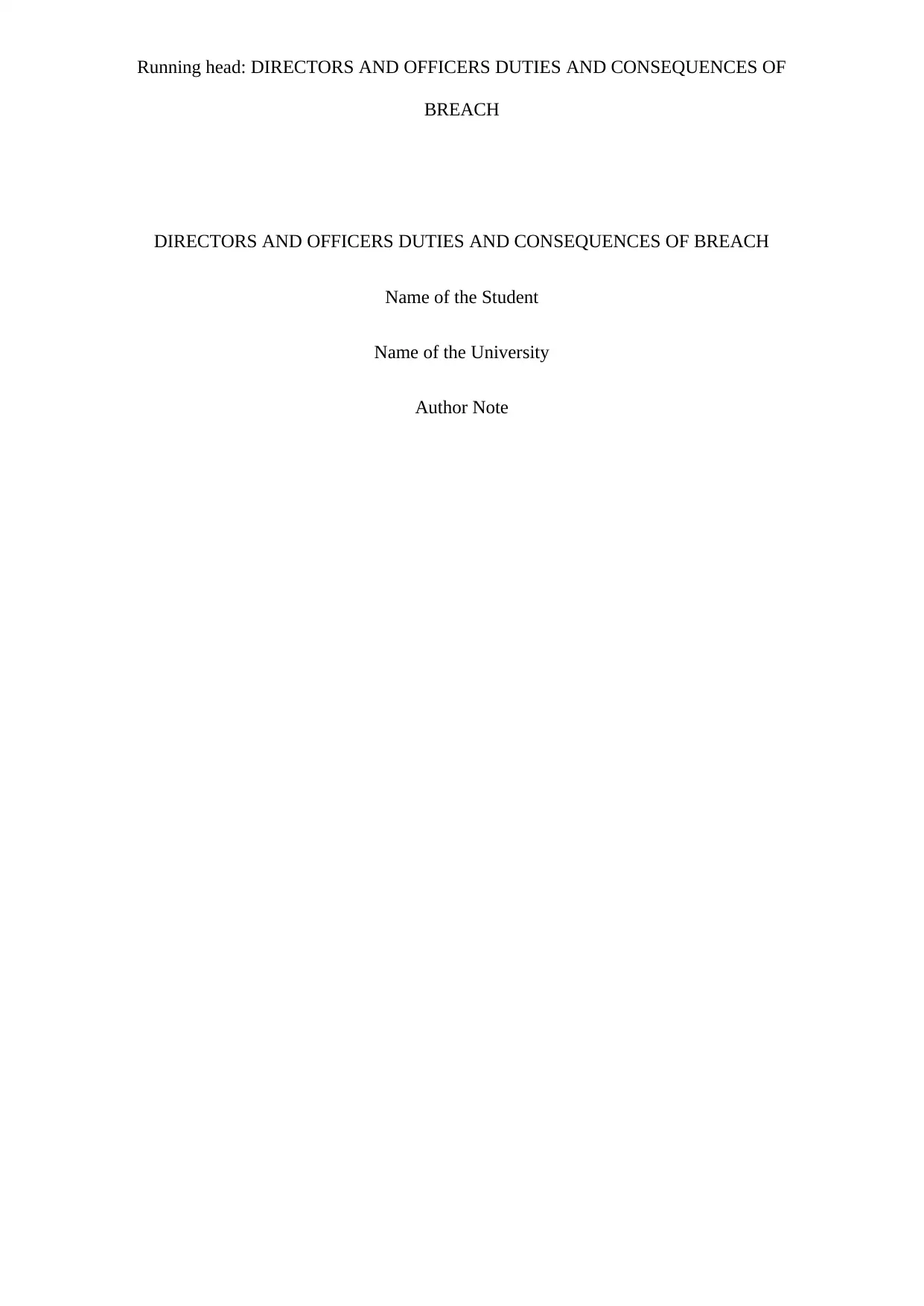
Running head: DIRECTORS AND OFFICERS DUTIES AND CONSEQUENCES OF
BREACH
DIRECTORS AND OFFICERS DUTIES AND CONSEQUENCES OF BREACH
Name of the Student
Name of the University
Author Note
BREACH
DIRECTORS AND OFFICERS DUTIES AND CONSEQUENCES OF BREACH
Name of the Student
Name of the University
Author Note
Paraphrase This Document
Need a fresh take? Get an instant paraphrase of this document with our AI Paraphraser
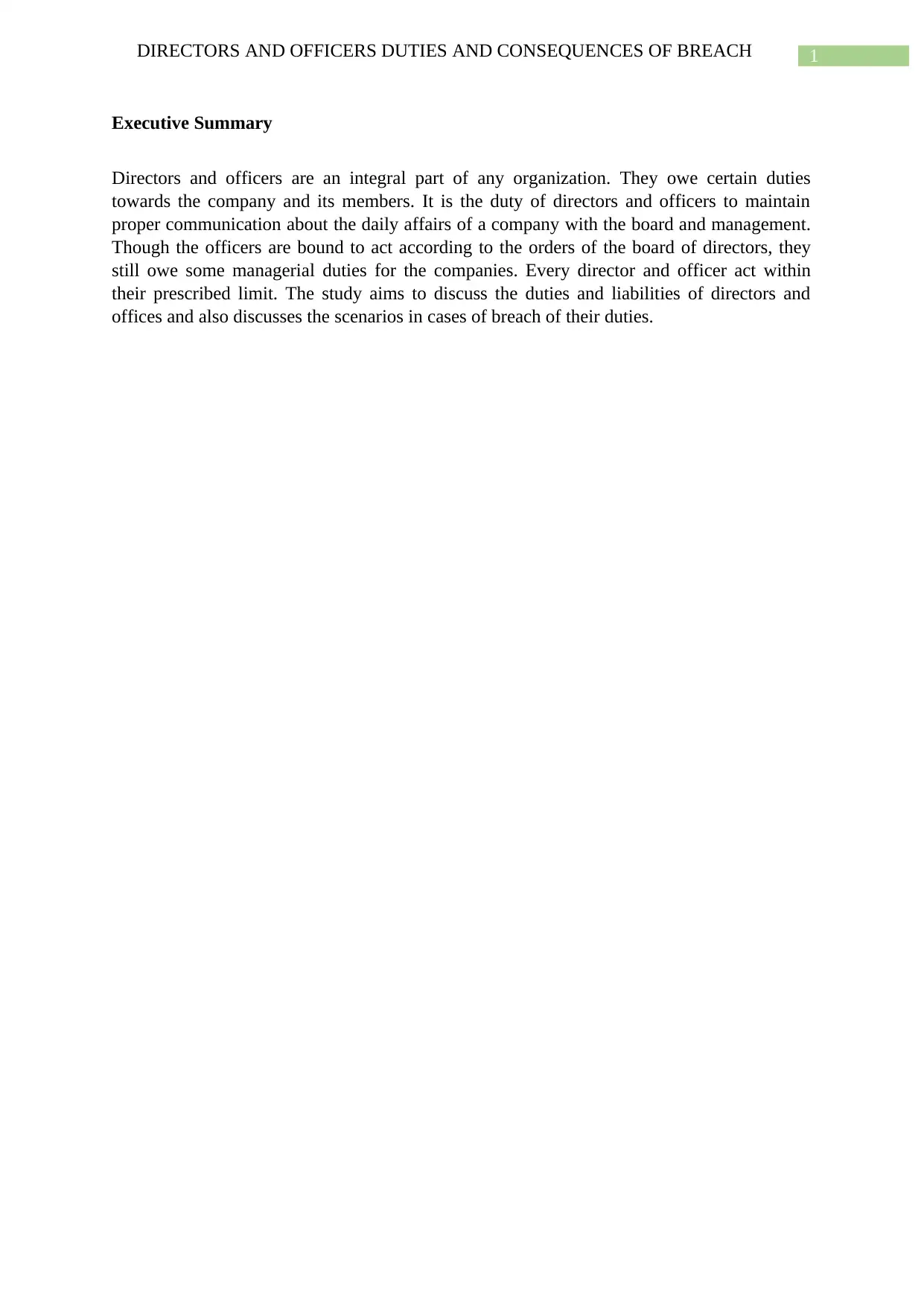
1DIRECTORS AND OFFICERS DUTIES AND CONSEQUENCES OF BREACH
Executive Summary
Directors and officers are an integral part of any organization. They owe certain duties
towards the company and its members. It is the duty of directors and officers to maintain
proper communication about the daily affairs of a company with the board and management.
Though the officers are bound to act according to the orders of the board of directors, they
still owe some managerial duties for the companies. Every director and officer act within
their prescribed limit. The study aims to discuss the duties and liabilities of directors and
offices and also discusses the scenarios in cases of breach of their duties.
Executive Summary
Directors and officers are an integral part of any organization. They owe certain duties
towards the company and its members. It is the duty of directors and officers to maintain
proper communication about the daily affairs of a company with the board and management.
Though the officers are bound to act according to the orders of the board of directors, they
still owe some managerial duties for the companies. Every director and officer act within
their prescribed limit. The study aims to discuss the duties and liabilities of directors and
offices and also discusses the scenarios in cases of breach of their duties.
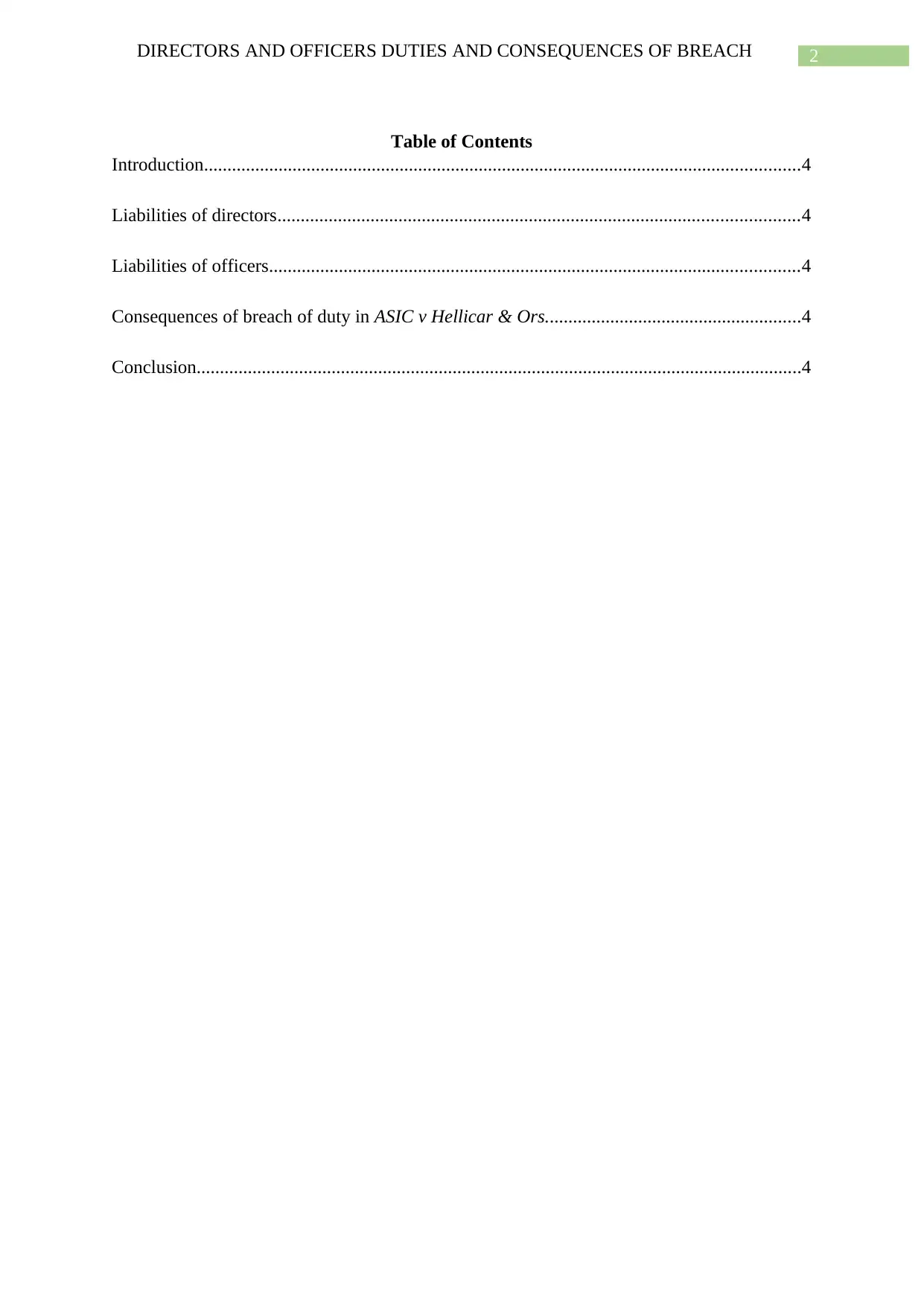
2DIRECTORS AND OFFICERS DUTIES AND CONSEQUENCES OF BREACH
Table of Contents
Introduction................................................................................................................................4
Liabilities of directors................................................................................................................4
Liabilities of officers..................................................................................................................4
Consequences of breach of duty in ASIC v Hellicar & Ors.......................................................4
Conclusion..................................................................................................................................4
Table of Contents
Introduction................................................................................................................................4
Liabilities of directors................................................................................................................4
Liabilities of officers..................................................................................................................4
Consequences of breach of duty in ASIC v Hellicar & Ors.......................................................4
Conclusion..................................................................................................................................4
⊘ This is a preview!⊘
Do you want full access?
Subscribe today to unlock all pages.

Trusted by 1+ million students worldwide
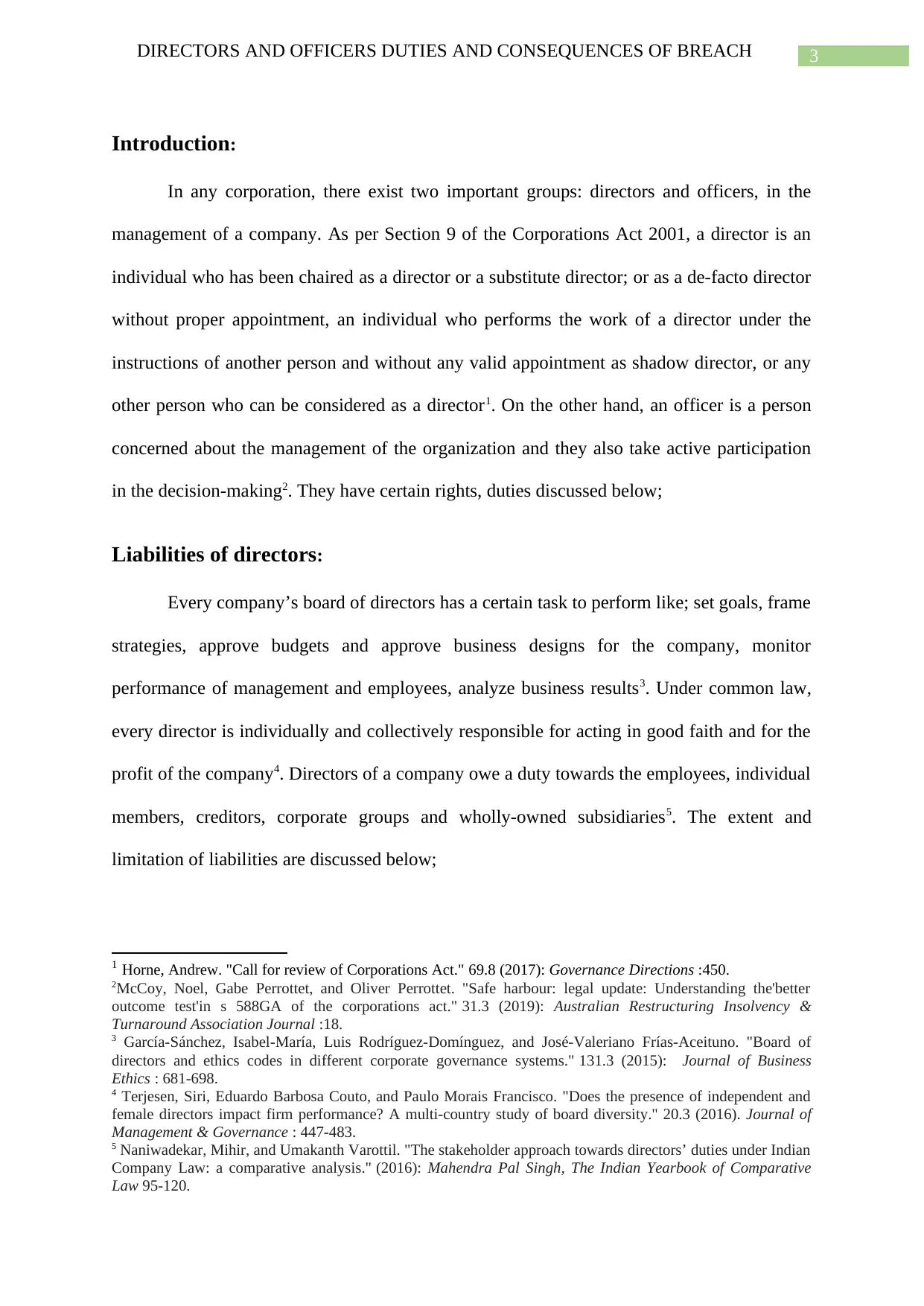
3DIRECTORS AND OFFICERS DUTIES AND CONSEQUENCES OF BREACH
Introduction:
In any corporation, there exist two important groups: directors and officers, in the
management of a company. As per Section 9 of the Corporations Act 2001, a director is an
individual who has been chaired as a director or a substitute director; or as a de-facto director
without proper appointment, an individual who performs the work of a director under the
instructions of another person and without any valid appointment as shadow director, or any
other person who can be considered as a director1. On the other hand, an officer is a person
concerned about the management of the organization and they also take active participation
in the decision-making2. They have certain rights, duties discussed below;
Liabilities of directors:
Every company’s board of directors has a certain task to perform like; set goals, frame
strategies, approve budgets and approve business designs for the company, monitor
performance of management and employees, analyze business results3. Under common law,
every director is individually and collectively responsible for acting in good faith and for the
profit of the company4. Directors of a company owe a duty towards the employees, individual
members, creditors, corporate groups and wholly-owned subsidiaries5. The extent and
limitation of liabilities are discussed below;
1 Horne, Andrew. "Call for review of Corporations Act." 69.8 (2017): Governance Directions :450.
2McCoy, Noel, Gabe Perrottet, and Oliver Perrottet. "Safe harbour: legal update: Understanding the'better
outcome test'in s 588GA of the corporations act." 31.3 (2019): Australian Restructuring Insolvency &
Turnaround Association Journal :18.
3 García-Sánchez, Isabel-María, Luis Rodríguez-Domínguez, and José-Valeriano Frías-Aceituno. "Board of
directors and ethics codes in different corporate governance systems." 131.3 (2015): Journal of Business
Ethics : 681-698.
4 Terjesen, Siri, Eduardo Barbosa Couto, and Paulo Morais Francisco. "Does the presence of independent and
female directors impact firm performance? A multi-country study of board diversity." 20.3 (2016). Journal of
Management & Governance : 447-483.
5 Naniwadekar, Mihir, and Umakanth Varottil. "The stakeholder approach towards directors’ duties under Indian
Company Law: a comparative analysis." (2016): Mahendra Pal Singh, The Indian Yearbook of Comparative
Law 95-120.
Introduction:
In any corporation, there exist two important groups: directors and officers, in the
management of a company. As per Section 9 of the Corporations Act 2001, a director is an
individual who has been chaired as a director or a substitute director; or as a de-facto director
without proper appointment, an individual who performs the work of a director under the
instructions of another person and without any valid appointment as shadow director, or any
other person who can be considered as a director1. On the other hand, an officer is a person
concerned about the management of the organization and they also take active participation
in the decision-making2. They have certain rights, duties discussed below;
Liabilities of directors:
Every company’s board of directors has a certain task to perform like; set goals, frame
strategies, approve budgets and approve business designs for the company, monitor
performance of management and employees, analyze business results3. Under common law,
every director is individually and collectively responsible for acting in good faith and for the
profit of the company4. Directors of a company owe a duty towards the employees, individual
members, creditors, corporate groups and wholly-owned subsidiaries5. The extent and
limitation of liabilities are discussed below;
1 Horne, Andrew. "Call for review of Corporations Act." 69.8 (2017): Governance Directions :450.
2McCoy, Noel, Gabe Perrottet, and Oliver Perrottet. "Safe harbour: legal update: Understanding the'better
outcome test'in s 588GA of the corporations act." 31.3 (2019): Australian Restructuring Insolvency &
Turnaround Association Journal :18.
3 García-Sánchez, Isabel-María, Luis Rodríguez-Domínguez, and José-Valeriano Frías-Aceituno. "Board of
directors and ethics codes in different corporate governance systems." 131.3 (2015): Journal of Business
Ethics : 681-698.
4 Terjesen, Siri, Eduardo Barbosa Couto, and Paulo Morais Francisco. "Does the presence of independent and
female directors impact firm performance? A multi-country study of board diversity." 20.3 (2016). Journal of
Management & Governance : 447-483.
5 Naniwadekar, Mihir, and Umakanth Varottil. "The stakeholder approach towards directors’ duties under Indian
Company Law: a comparative analysis." (2016): Mahendra Pal Singh, The Indian Yearbook of Comparative
Law 95-120.
Paraphrase This Document
Need a fresh take? Get an instant paraphrase of this document with our AI Paraphraser
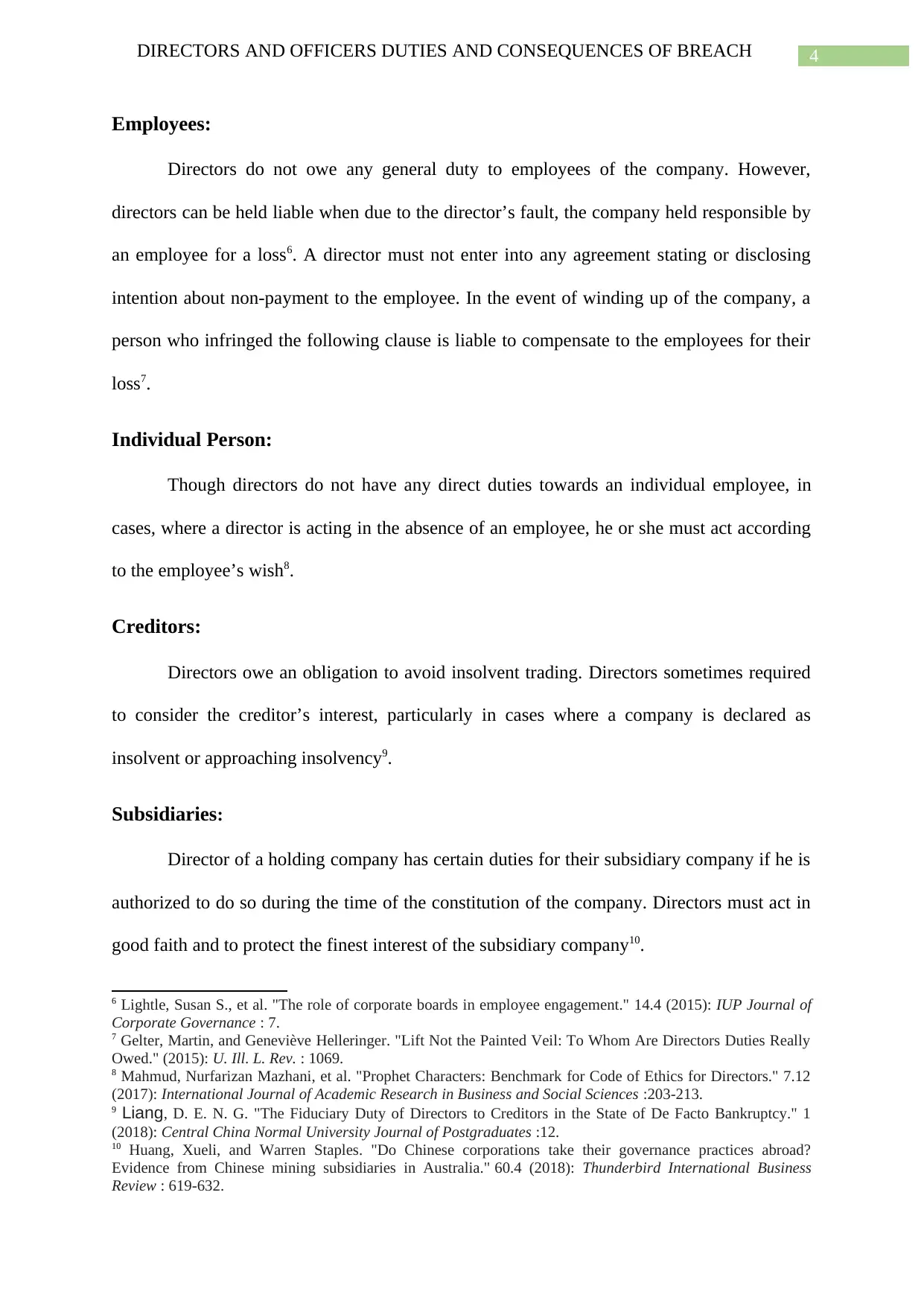
4DIRECTORS AND OFFICERS DUTIES AND CONSEQUENCES OF BREACH
Employees:
Directors do not owe any general duty to employees of the company. However,
directors can be held liable when due to the director’s fault, the company held responsible by
an employee for a loss6. A director must not enter into any agreement stating or disclosing
intention about non-payment to the employee. In the event of winding up of the company, a
person who infringed the following clause is liable to compensate to the employees for their
loss7.
Individual Person:
Though directors do not have any direct duties towards an individual employee, in
cases, where a director is acting in the absence of an employee, he or she must act according
to the employee’s wish8.
Creditors:
Directors owe an obligation to avoid insolvent trading. Directors sometimes required
to consider the creditor’s interest, particularly in cases where a company is declared as
insolvent or approaching insolvency9.
Subsidiaries:
Director of a holding company has certain duties for their subsidiary company if he is
authorized to do so during the time of the constitution of the company. Directors must act in
good faith and to protect the finest interest of the subsidiary company10.
6 Lightle, Susan S., et al. "The role of corporate boards in employee engagement." 14.4 (2015): IUP Journal of
Corporate Governance : 7.
7 Gelter, Martin, and Geneviève Helleringer. "Lift Not the Painted Veil: To Whom Are Directors Duties Really
Owed." (2015): U. Ill. L. Rev. : 1069.
8 Mahmud, Nurfarizan Mazhani, et al. "Prophet Characters: Benchmark for Code of Ethics for Directors." 7.12
(2017): International Journal of Academic Research in Business and Social Sciences :203-213.
9 Liang, D. E. N. G. "The Fiduciary Duty of Directors to Creditors in the State of De Facto Bankruptcy." 1
(2018): Central China Normal University Journal of Postgraduates :12.
10 Huang, Xueli, and Warren Staples. "Do Chinese corporations take their governance practices abroad?
Evidence from Chinese mining subsidiaries in Australia." 60.4 (2018): Thunderbird International Business
Review : 619-632.
Employees:
Directors do not owe any general duty to employees of the company. However,
directors can be held liable when due to the director’s fault, the company held responsible by
an employee for a loss6. A director must not enter into any agreement stating or disclosing
intention about non-payment to the employee. In the event of winding up of the company, a
person who infringed the following clause is liable to compensate to the employees for their
loss7.
Individual Person:
Though directors do not have any direct duties towards an individual employee, in
cases, where a director is acting in the absence of an employee, he or she must act according
to the employee’s wish8.
Creditors:
Directors owe an obligation to avoid insolvent trading. Directors sometimes required
to consider the creditor’s interest, particularly in cases where a company is declared as
insolvent or approaching insolvency9.
Subsidiaries:
Director of a holding company has certain duties for their subsidiary company if he is
authorized to do so during the time of the constitution of the company. Directors must act in
good faith and to protect the finest interest of the subsidiary company10.
6 Lightle, Susan S., et al. "The role of corporate boards in employee engagement." 14.4 (2015): IUP Journal of
Corporate Governance : 7.
7 Gelter, Martin, and Geneviève Helleringer. "Lift Not the Painted Veil: To Whom Are Directors Duties Really
Owed." (2015): U. Ill. L. Rev. : 1069.
8 Mahmud, Nurfarizan Mazhani, et al. "Prophet Characters: Benchmark for Code of Ethics for Directors." 7.12
(2017): International Journal of Academic Research in Business and Social Sciences :203-213.
9 Liang, D. E. N. G. "The Fiduciary Duty of Directors to Creditors in the State of De Facto Bankruptcy." 1
(2018): Central China Normal University Journal of Postgraduates :12.
10 Huang, Xueli, and Warren Staples. "Do Chinese corporations take their governance practices abroad?
Evidence from Chinese mining subsidiaries in Australia." 60.4 (2018): Thunderbird International Business
Review : 619-632.
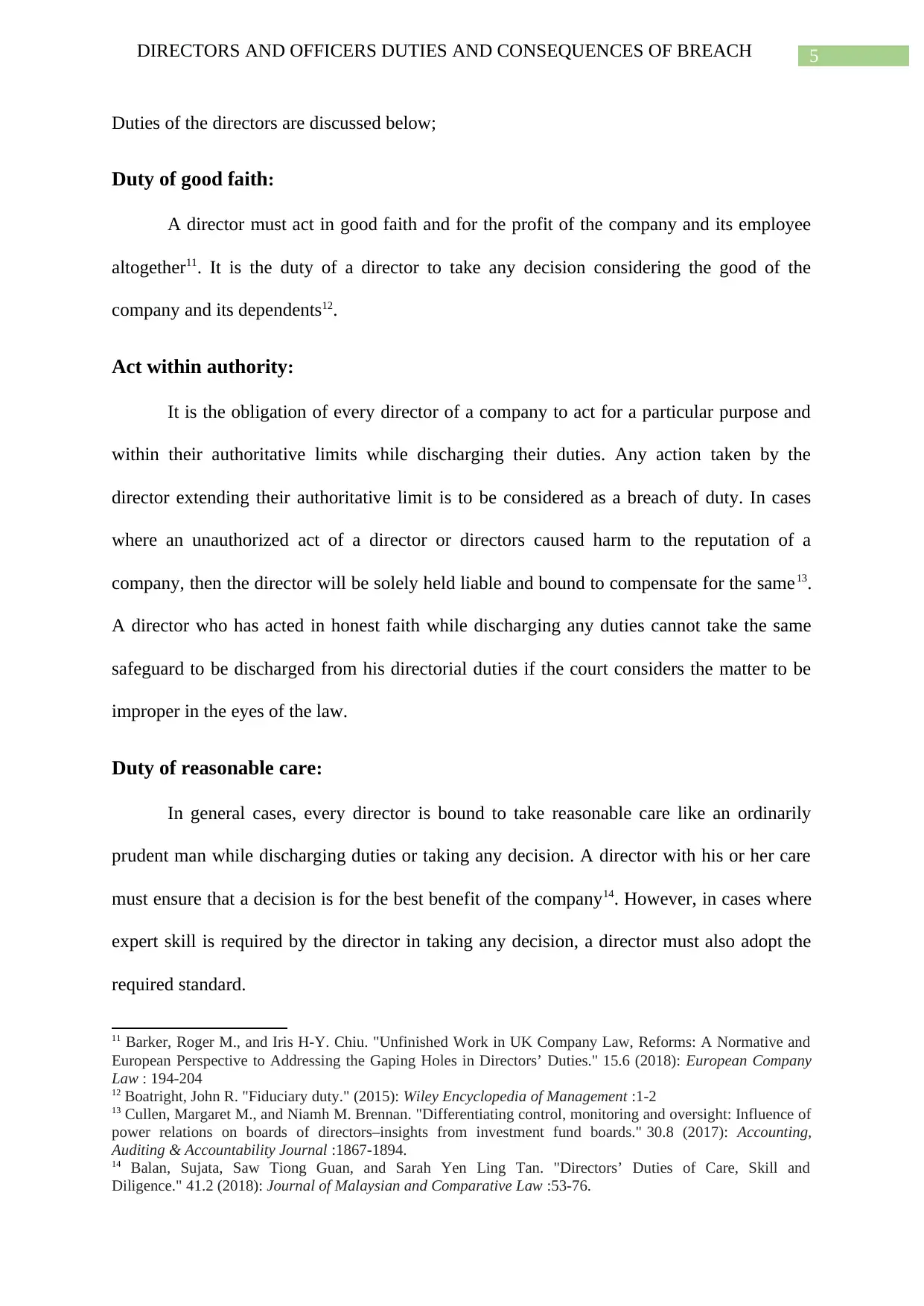
5DIRECTORS AND OFFICERS DUTIES AND CONSEQUENCES OF BREACH
Duties of the directors are discussed below;
Duty of good faith:
A director must act in good faith and for the profit of the company and its employee
altogether11. It is the duty of a director to take any decision considering the good of the
company and its dependents12.
Act within authority:
It is the obligation of every director of a company to act for a particular purpose and
within their authoritative limits while discharging their duties. Any action taken by the
director extending their authoritative limit is to be considered as a breach of duty. In cases
where an unauthorized act of a director or directors caused harm to the reputation of a
company, then the director will be solely held liable and bound to compensate for the same13.
A director who has acted in honest faith while discharging any duties cannot take the same
safeguard to be discharged from his directorial duties if the court considers the matter to be
improper in the eyes of the law.
Duty of reasonable care:
In general cases, every director is bound to take reasonable care like an ordinarily
prudent man while discharging duties or taking any decision. A director with his or her care
must ensure that a decision is for the best benefit of the company14. However, in cases where
expert skill is required by the director in taking any decision, a director must also adopt the
required standard.
11 Barker, Roger M., and Iris H-Y. Chiu. "Unfinished Work in UK Company Law, Reforms: A Normative and
European Perspective to Addressing the Gaping Holes in Directors’ Duties." 15.6 (2018): European Company
Law : 194-204
12 Boatright, John R. "Fiduciary duty." (2015): Wiley Encyclopedia of Management :1-2
13 Cullen, Margaret M., and Niamh M. Brennan. "Differentiating control, monitoring and oversight: Influence of
power relations on boards of directors–insights from investment fund boards." 30.8 (2017): Accounting,
Auditing & Accountability Journal :1867-1894.
14 Balan, Sujata, Saw Tiong Guan, and Sarah Yen Ling Tan. "Directors’ Duties of Care, Skill and
Diligence." 41.2 (2018): Journal of Malaysian and Comparative Law :53-76.
Duties of the directors are discussed below;
Duty of good faith:
A director must act in good faith and for the profit of the company and its employee
altogether11. It is the duty of a director to take any decision considering the good of the
company and its dependents12.
Act within authority:
It is the obligation of every director of a company to act for a particular purpose and
within their authoritative limits while discharging their duties. Any action taken by the
director extending their authoritative limit is to be considered as a breach of duty. In cases
where an unauthorized act of a director or directors caused harm to the reputation of a
company, then the director will be solely held liable and bound to compensate for the same13.
A director who has acted in honest faith while discharging any duties cannot take the same
safeguard to be discharged from his directorial duties if the court considers the matter to be
improper in the eyes of the law.
Duty of reasonable care:
In general cases, every director is bound to take reasonable care like an ordinarily
prudent man while discharging duties or taking any decision. A director with his or her care
must ensure that a decision is for the best benefit of the company14. However, in cases where
expert skill is required by the director in taking any decision, a director must also adopt the
required standard.
11 Barker, Roger M., and Iris H-Y. Chiu. "Unfinished Work in UK Company Law, Reforms: A Normative and
European Perspective to Addressing the Gaping Holes in Directors’ Duties." 15.6 (2018): European Company
Law : 194-204
12 Boatright, John R. "Fiduciary duty." (2015): Wiley Encyclopedia of Management :1-2
13 Cullen, Margaret M., and Niamh M. Brennan. "Differentiating control, monitoring and oversight: Influence of
power relations on boards of directors–insights from investment fund boards." 30.8 (2017): Accounting,
Auditing & Accountability Journal :1867-1894.
14 Balan, Sujata, Saw Tiong Guan, and Sarah Yen Ling Tan. "Directors’ Duties of Care, Skill and
Diligence." 41.2 (2018): Journal of Malaysian and Comparative Law :53-76.
⊘ This is a preview!⊘
Do you want full access?
Subscribe today to unlock all pages.

Trusted by 1+ million students worldwide
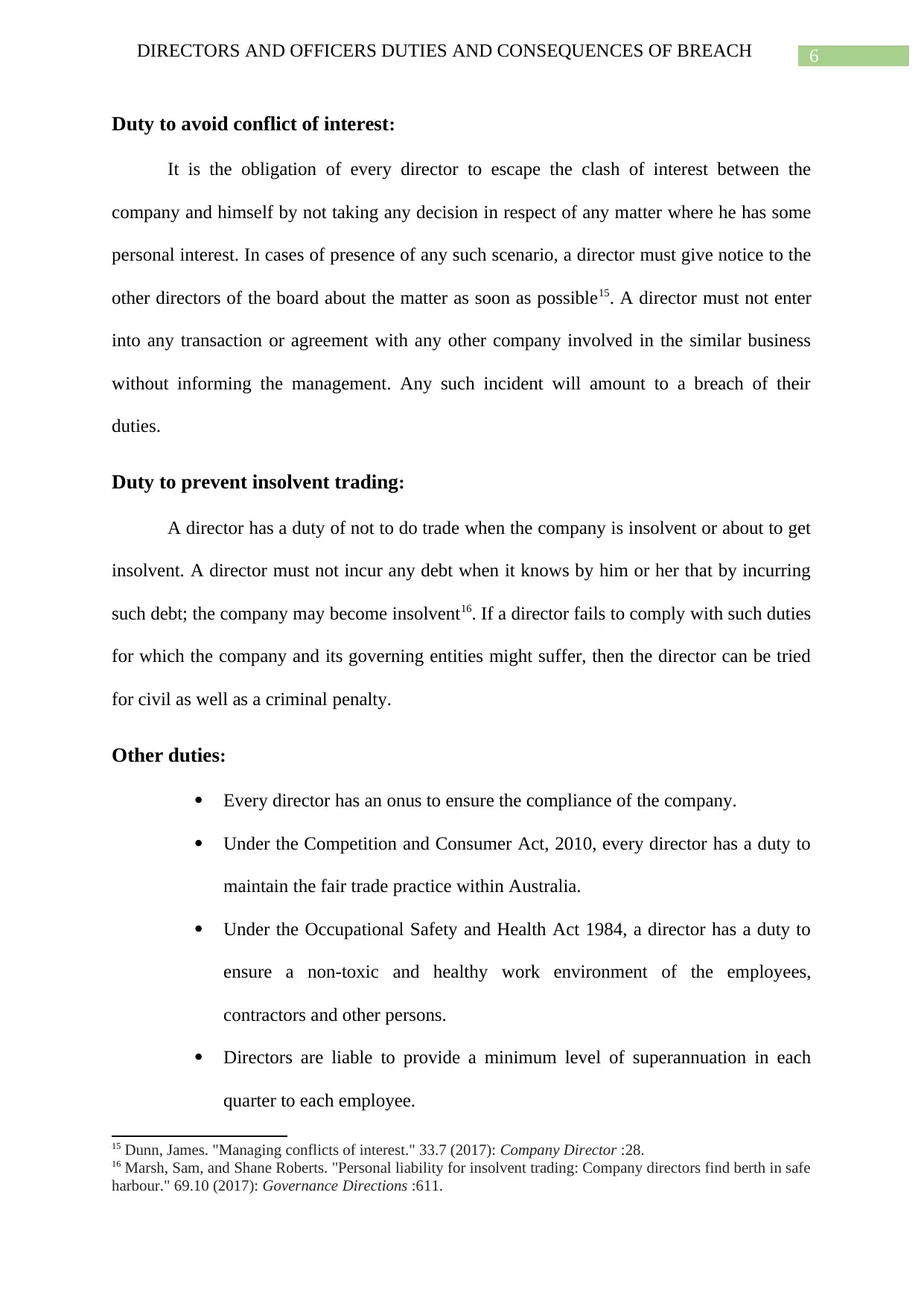
6DIRECTORS AND OFFICERS DUTIES AND CONSEQUENCES OF BREACH
Duty to avoid conflict of interest:
It is the obligation of every director to escape the clash of interest between the
company and himself by not taking any decision in respect of any matter where he has some
personal interest. In cases of presence of any such scenario, a director must give notice to the
other directors of the board about the matter as soon as possible15. A director must not enter
into any transaction or agreement with any other company involved in the similar business
without informing the management. Any such incident will amount to a breach of their
duties.
Duty to prevent insolvent trading:
A director has a duty of not to do trade when the company is insolvent or about to get
insolvent. A director must not incur any debt when it knows by him or her that by incurring
such debt; the company may become insolvent16. If a director fails to comply with such duties
for which the company and its governing entities might suffer, then the director can be tried
for civil as well as a criminal penalty.
Other duties:
Every director has an onus to ensure the compliance of the company.
Under the Competition and Consumer Act, 2010, every director has a duty to
maintain the fair trade practice within Australia.
Under the Occupational Safety and Health Act 1984, a director has a duty to
ensure a non-toxic and healthy work environment of the employees,
contractors and other persons.
Directors are liable to provide a minimum level of superannuation in each
quarter to each employee.
15 Dunn, James. "Managing conflicts of interest." 33.7 (2017): Company Director :28.
16 Marsh, Sam, and Shane Roberts. "Personal liability for insolvent trading: Company directors find berth in safe
harbour." 69.10 (2017): Governance Directions :611.
Duty to avoid conflict of interest:
It is the obligation of every director to escape the clash of interest between the
company and himself by not taking any decision in respect of any matter where he has some
personal interest. In cases of presence of any such scenario, a director must give notice to the
other directors of the board about the matter as soon as possible15. A director must not enter
into any transaction or agreement with any other company involved in the similar business
without informing the management. Any such incident will amount to a breach of their
duties.
Duty to prevent insolvent trading:
A director has a duty of not to do trade when the company is insolvent or about to get
insolvent. A director must not incur any debt when it knows by him or her that by incurring
such debt; the company may become insolvent16. If a director fails to comply with such duties
for which the company and its governing entities might suffer, then the director can be tried
for civil as well as a criminal penalty.
Other duties:
Every director has an onus to ensure the compliance of the company.
Under the Competition and Consumer Act, 2010, every director has a duty to
maintain the fair trade practice within Australia.
Under the Occupational Safety and Health Act 1984, a director has a duty to
ensure a non-toxic and healthy work environment of the employees,
contractors and other persons.
Directors are liable to provide a minimum level of superannuation in each
quarter to each employee.
15 Dunn, James. "Managing conflicts of interest." 33.7 (2017): Company Director :28.
16 Marsh, Sam, and Shane Roberts. "Personal liability for insolvent trading: Company directors find berth in safe
harbour." 69.10 (2017): Governance Directions :611.
Paraphrase This Document
Need a fresh take? Get an instant paraphrase of this document with our AI Paraphraser
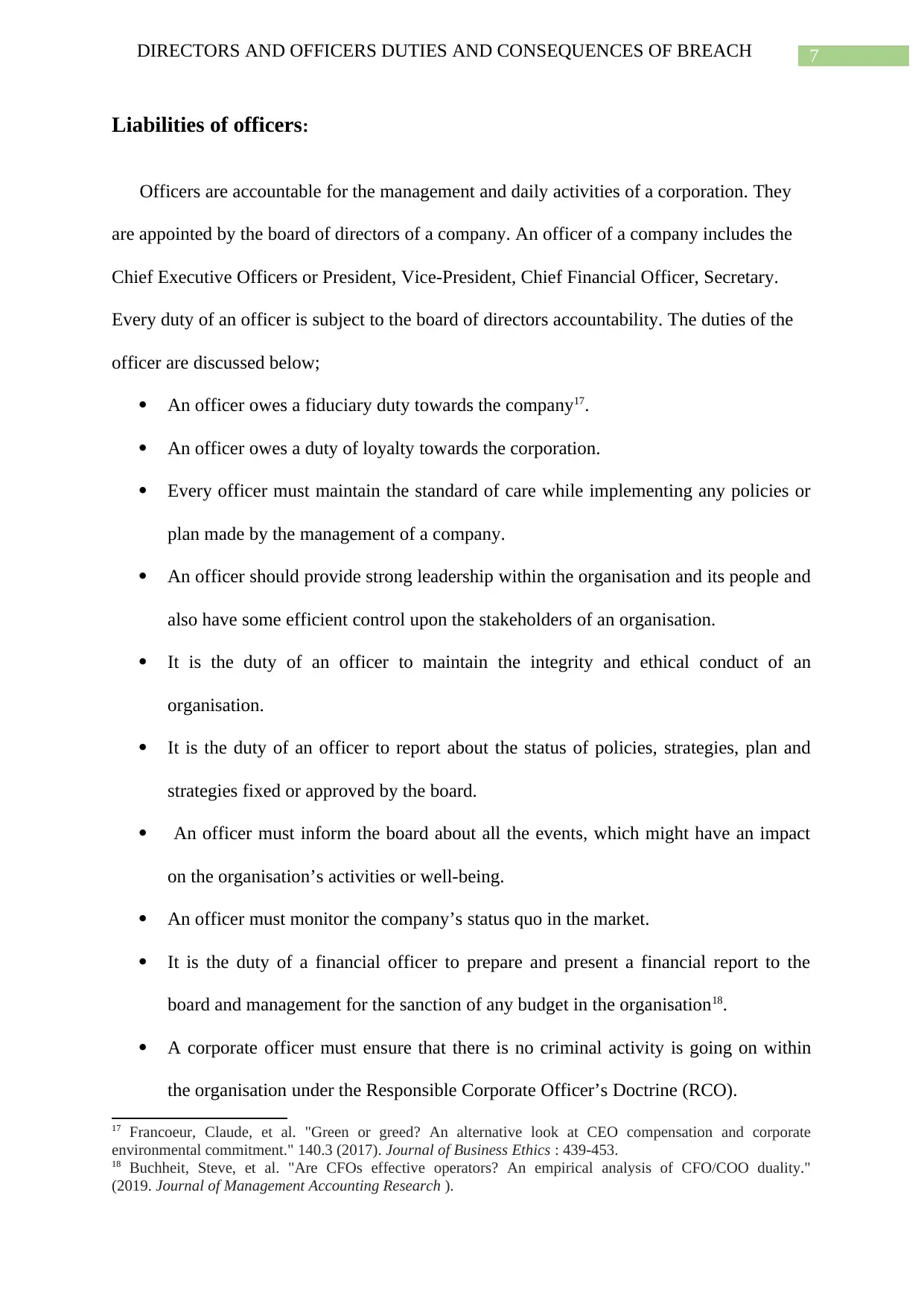
7DIRECTORS AND OFFICERS DUTIES AND CONSEQUENCES OF BREACH
Liabilities of officers:
Officers are accountable for the management and daily activities of a corporation. They
are appointed by the board of directors of a company. An officer of a company includes the
Chief Executive Officers or President, Vice-President, Chief Financial Officer, Secretary.
Every duty of an officer is subject to the board of directors accountability. The duties of the
officer are discussed below;
An officer owes a fiduciary duty towards the company17.
An officer owes a duty of loyalty towards the corporation.
Every officer must maintain the standard of care while implementing any policies or
plan made by the management of a company.
An officer should provide strong leadership within the organisation and its people and
also have some efficient control upon the stakeholders of an organisation.
It is the duty of an officer to maintain the integrity and ethical conduct of an
organisation.
It is the duty of an officer to report about the status of policies, strategies, plan and
strategies fixed or approved by the board.
An officer must inform the board about all the events, which might have an impact
on the organisation’s activities or well-being.
An officer must monitor the company’s status quo in the market.
It is the duty of a financial officer to prepare and present a financial report to the
board and management for the sanction of any budget in the organisation18.
A corporate officer must ensure that there is no criminal activity is going on within
the organisation under the Responsible Corporate Officer’s Doctrine (RCO).
17 Francoeur, Claude, et al. "Green or greed? An alternative look at CEO compensation and corporate
environmental commitment." 140.3 (2017). Journal of Business Ethics : 439-453.
18 Buchheit, Steve, et al. "Are CFOs effective operators? An empirical analysis of CFO/COO duality."
(2019. Journal of Management Accounting Research ).
Liabilities of officers:
Officers are accountable for the management and daily activities of a corporation. They
are appointed by the board of directors of a company. An officer of a company includes the
Chief Executive Officers or President, Vice-President, Chief Financial Officer, Secretary.
Every duty of an officer is subject to the board of directors accountability. The duties of the
officer are discussed below;
An officer owes a fiduciary duty towards the company17.
An officer owes a duty of loyalty towards the corporation.
Every officer must maintain the standard of care while implementing any policies or
plan made by the management of a company.
An officer should provide strong leadership within the organisation and its people and
also have some efficient control upon the stakeholders of an organisation.
It is the duty of an officer to maintain the integrity and ethical conduct of an
organisation.
It is the duty of an officer to report about the status of policies, strategies, plan and
strategies fixed or approved by the board.
An officer must inform the board about all the events, which might have an impact
on the organisation’s activities or well-being.
An officer must monitor the company’s status quo in the market.
It is the duty of a financial officer to prepare and present a financial report to the
board and management for the sanction of any budget in the organisation18.
A corporate officer must ensure that there is no criminal activity is going on within
the organisation under the Responsible Corporate Officer’s Doctrine (RCO).
17 Francoeur, Claude, et al. "Green or greed? An alternative look at CEO compensation and corporate
environmental commitment." 140.3 (2017). Journal of Business Ethics : 439-453.
18 Buchheit, Steve, et al. "Are CFOs effective operators? An empirical analysis of CFO/COO duality."
(2019. Journal of Management Accounting Research ).
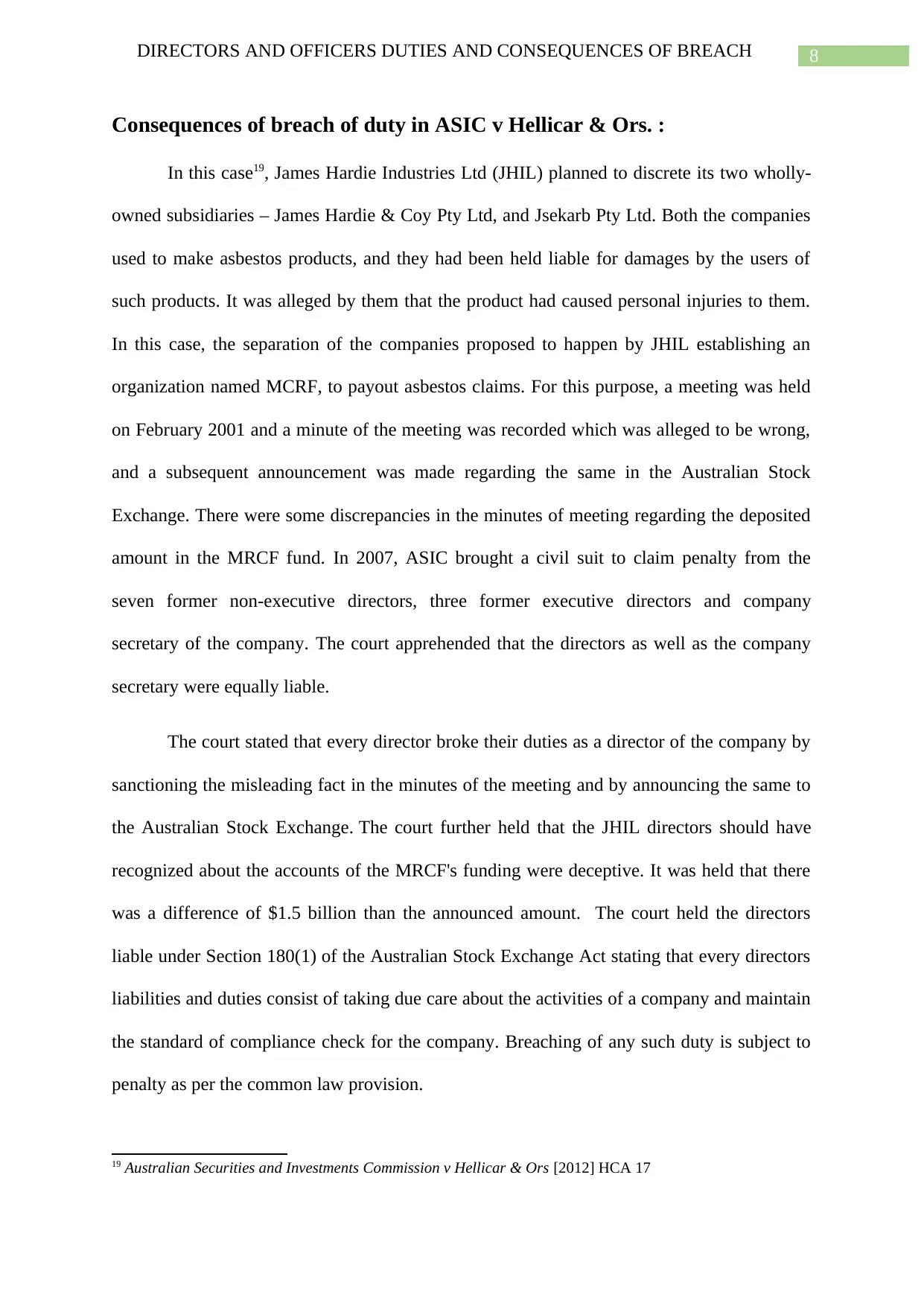
8DIRECTORS AND OFFICERS DUTIES AND CONSEQUENCES OF BREACH
Consequences of breach of duty in ASIC v Hellicar & Ors. :
In this case19, James Hardie Industries Ltd (JHIL) planned to discrete its two wholly-
owned subsidiaries – James Hardie & Coy Pty Ltd, and Jsekarb Pty Ltd. Both the companies
used to make asbestos products, and they had been held liable for damages by the users of
such products. It was alleged by them that the product had caused personal injuries to them.
In this case, the separation of the companies proposed to happen by JHIL establishing an
organization named MCRF, to payout asbestos claims. For this purpose, a meeting was held
on February 2001 and a minute of the meeting was recorded which was alleged to be wrong,
and a subsequent announcement was made regarding the same in the Australian Stock
Exchange. There were some discrepancies in the minutes of meeting regarding the deposited
amount in the MRCF fund. In 2007, ASIC brought a civil suit to claim penalty from the
seven former non-executive directors, three former executive directors and company
secretary of the company. The court apprehended that the directors as well as the company
secretary were equally liable.
The court stated that every director broke their duties as a director of the company by
sanctioning the misleading fact in the minutes of the meeting and by announcing the same to
the Australian Stock Exchange. The court further held that the JHIL directors should have
recognized about the accounts of the MRCF's funding were deceptive. It was held that there
was a difference of $1.5 billion than the announced amount. The court held the directors
liable under Section 180(1) of the Australian Stock Exchange Act stating that every directors
liabilities and duties consist of taking due care about the activities of a company and maintain
the standard of compliance check for the company. Breaching of any such duty is subject to
penalty as per the common law provision.
19 Australian Securities and Investments Commission v Hellicar & Ors [2012] HCA 17
Consequences of breach of duty in ASIC v Hellicar & Ors. :
In this case19, James Hardie Industries Ltd (JHIL) planned to discrete its two wholly-
owned subsidiaries – James Hardie & Coy Pty Ltd, and Jsekarb Pty Ltd. Both the companies
used to make asbestos products, and they had been held liable for damages by the users of
such products. It was alleged by them that the product had caused personal injuries to them.
In this case, the separation of the companies proposed to happen by JHIL establishing an
organization named MCRF, to payout asbestos claims. For this purpose, a meeting was held
on February 2001 and a minute of the meeting was recorded which was alleged to be wrong,
and a subsequent announcement was made regarding the same in the Australian Stock
Exchange. There were some discrepancies in the minutes of meeting regarding the deposited
amount in the MRCF fund. In 2007, ASIC brought a civil suit to claim penalty from the
seven former non-executive directors, three former executive directors and company
secretary of the company. The court apprehended that the directors as well as the company
secretary were equally liable.
The court stated that every director broke their duties as a director of the company by
sanctioning the misleading fact in the minutes of the meeting and by announcing the same to
the Australian Stock Exchange. The court further held that the JHIL directors should have
recognized about the accounts of the MRCF's funding were deceptive. It was held that there
was a difference of $1.5 billion than the announced amount. The court held the directors
liable under Section 180(1) of the Australian Stock Exchange Act stating that every directors
liabilities and duties consist of taking due care about the activities of a company and maintain
the standard of compliance check for the company. Breaching of any such duty is subject to
penalty as per the common law provision.
19 Australian Securities and Investments Commission v Hellicar & Ors [2012] HCA 17
⊘ This is a preview!⊘
Do you want full access?
Subscribe today to unlock all pages.

Trusted by 1+ million students worldwide
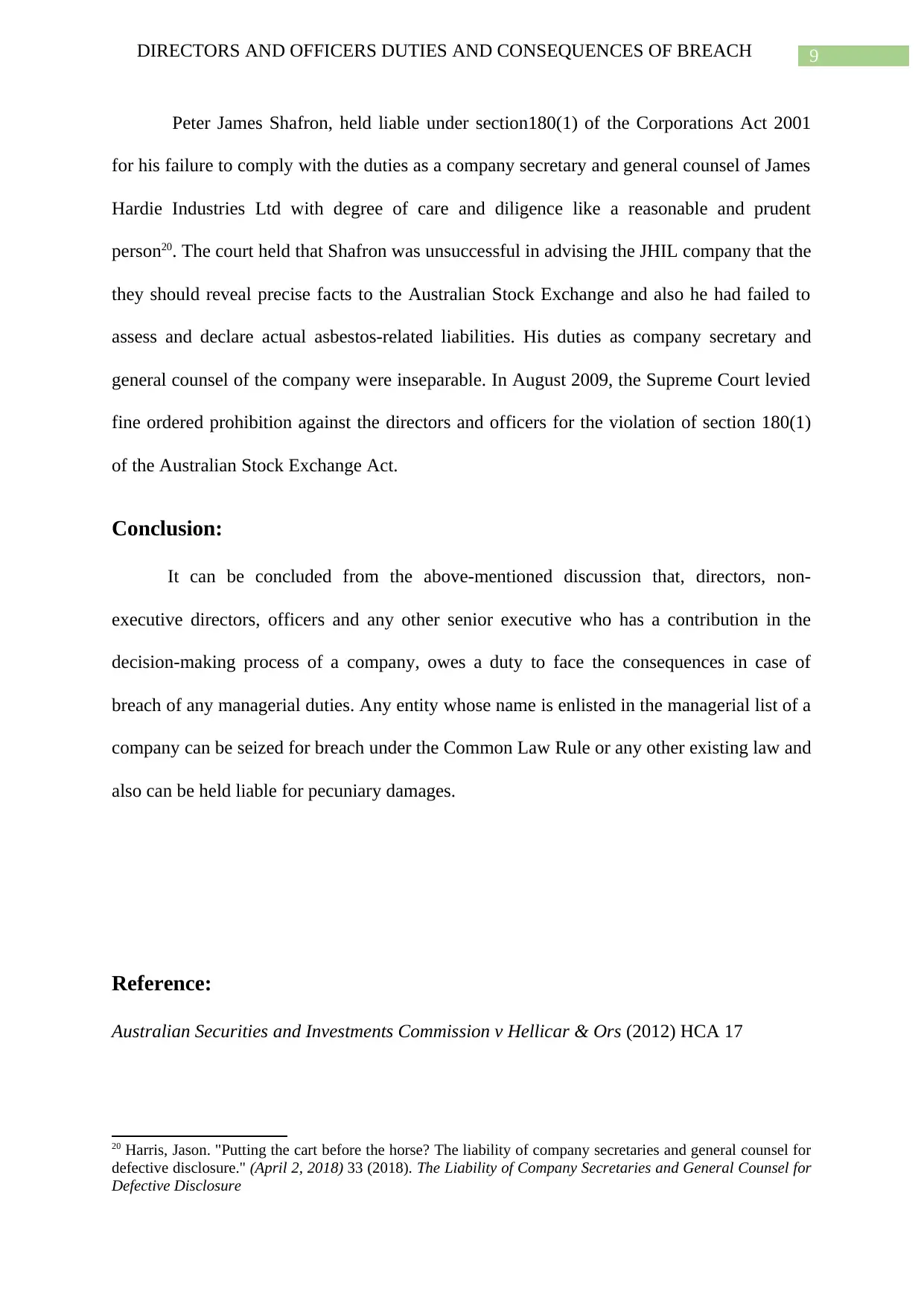
9DIRECTORS AND OFFICERS DUTIES AND CONSEQUENCES OF BREACH
Peter James Shafron, held liable under section180(1) of the Corporations Act 2001
for his failure to comply with the duties as a company secretary and general counsel of James
Hardie Industries Ltd with degree of care and diligence like a reasonable and prudent
person20. The court held that Shafron was unsuccessful in advising the JHIL company that the
they should reveal precise facts to the Australian Stock Exchange and also he had failed to
assess and declare actual asbestos-related liabilities. His duties as company secretary and
general counsel of the company were inseparable. In August 2009, the Supreme Court levied
fine ordered prohibition against the directors and officers for the violation of section 180(1)
of the Australian Stock Exchange Act.
Conclusion:
It can be concluded from the above-mentioned discussion that, directors, non-
executive directors, officers and any other senior executive who has a contribution in the
decision-making process of a company, owes a duty to face the consequences in case of
breach of any managerial duties. Any entity whose name is enlisted in the managerial list of a
company can be seized for breach under the Common Law Rule or any other existing law and
also can be held liable for pecuniary damages.
Reference:
Australian Securities and Investments Commission v Hellicar & Ors (2012) HCA 17
20 Harris, Jason. "Putting the cart before the horse? The liability of company secretaries and general counsel for
defective disclosure." (April 2, 2018) 33 (2018). The Liability of Company Secretaries and General Counsel for
Defective Disclosure
Peter James Shafron, held liable under section180(1) of the Corporations Act 2001
for his failure to comply with the duties as a company secretary and general counsel of James
Hardie Industries Ltd with degree of care and diligence like a reasonable and prudent
person20. The court held that Shafron was unsuccessful in advising the JHIL company that the
they should reveal precise facts to the Australian Stock Exchange and also he had failed to
assess and declare actual asbestos-related liabilities. His duties as company secretary and
general counsel of the company were inseparable. In August 2009, the Supreme Court levied
fine ordered prohibition against the directors and officers for the violation of section 180(1)
of the Australian Stock Exchange Act.
Conclusion:
It can be concluded from the above-mentioned discussion that, directors, non-
executive directors, officers and any other senior executive who has a contribution in the
decision-making process of a company, owes a duty to face the consequences in case of
breach of any managerial duties. Any entity whose name is enlisted in the managerial list of a
company can be seized for breach under the Common Law Rule or any other existing law and
also can be held liable for pecuniary damages.
Reference:
Australian Securities and Investments Commission v Hellicar & Ors (2012) HCA 17
20 Harris, Jason. "Putting the cart before the horse? The liability of company secretaries and general counsel for
defective disclosure." (April 2, 2018) 33 (2018). The Liability of Company Secretaries and General Counsel for
Defective Disclosure
Paraphrase This Document
Need a fresh take? Get an instant paraphrase of this document with our AI Paraphraser
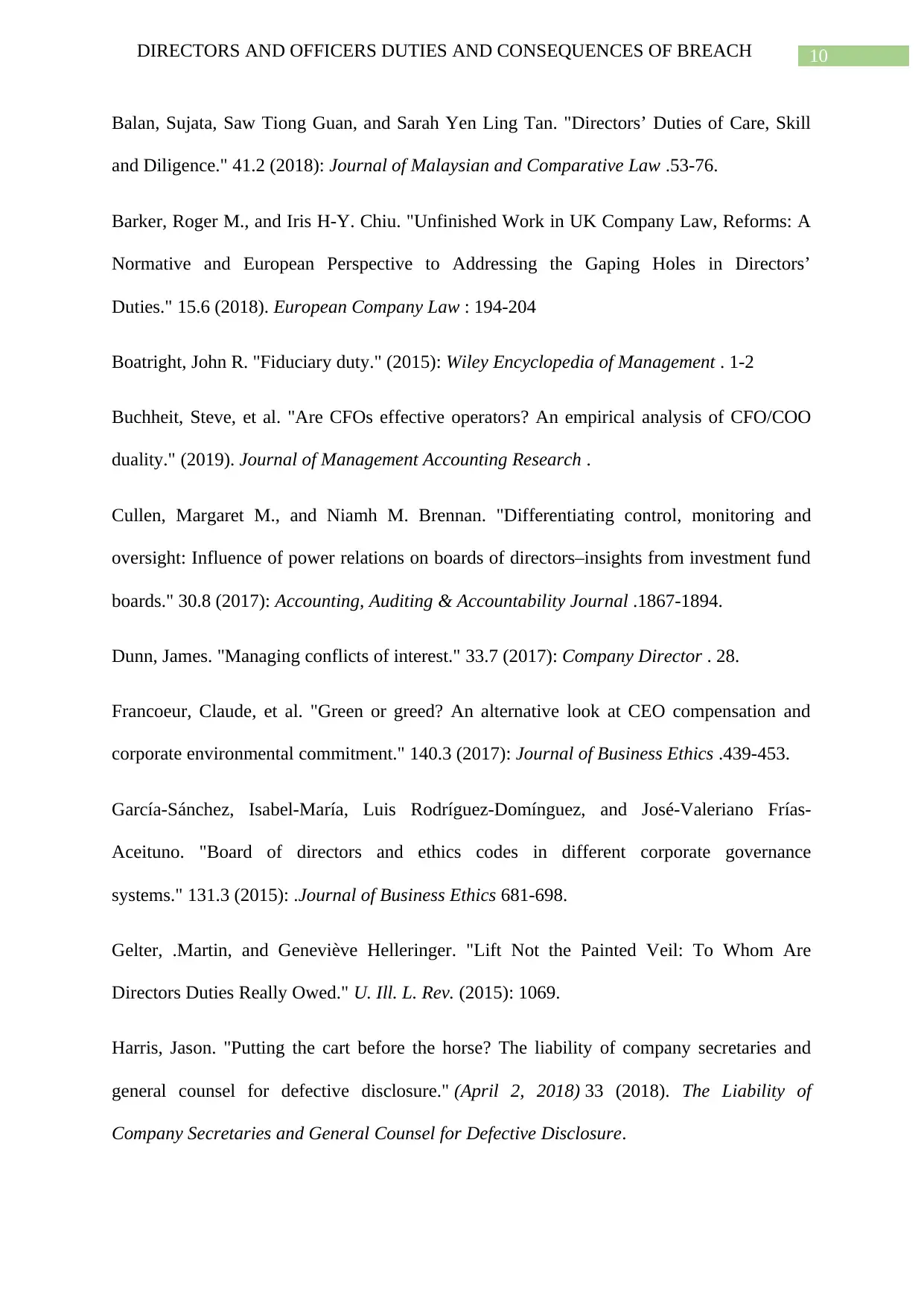
10DIRECTORS AND OFFICERS DUTIES AND CONSEQUENCES OF BREACH
Balan, Sujata, Saw Tiong Guan, and Sarah Yen Ling Tan. "Directors’ Duties of Care, Skill
and Diligence." 41.2 (2018): Journal of Malaysian and Comparative Law .53-76.
Barker, Roger M., and Iris H-Y. Chiu. "Unfinished Work in UK Company Law, Reforms: A
Normative and European Perspective to Addressing the Gaping Holes in Directors’
Duties." 15.6 (2018). European Company Law : 194-204
Boatright, John R. "Fiduciary duty." (2015): Wiley Encyclopedia of Management . 1-2
Buchheit, Steve, et al. "Are CFOs effective operators? An empirical analysis of CFO/COO
duality." (2019). Journal of Management Accounting Research .
Cullen, Margaret M., and Niamh M. Brennan. "Differentiating control, monitoring and
oversight: Influence of power relations on boards of directors–insights from investment fund
boards." 30.8 (2017): Accounting, Auditing & Accountability Journal .1867-1894.
Dunn, James. "Managing conflicts of interest." 33.7 (2017): Company Director . 28.
Francoeur, Claude, et al. "Green or greed? An alternative look at CEO compensation and
corporate environmental commitment." 140.3 (2017): Journal of Business Ethics .439-453.
García-Sánchez, Isabel-María, Luis Rodríguez-Domínguez, and José-Valeriano Frías-
Aceituno. "Board of directors and ethics codes in different corporate governance
systems." 131.3 (2015): .Journal of Business Ethics 681-698.
Gelter, .Martin, and Geneviève Helleringer. "Lift Not the Painted Veil: To Whom Are
Directors Duties Really Owed." U. Ill. L. Rev. (2015): 1069.
Harris, Jason. "Putting the cart before the horse? The liability of company secretaries and
general counsel for defective disclosure." (April 2, 2018) 33 (2018). The Liability of
Company Secretaries and General Counsel for Defective Disclosure.
Balan, Sujata, Saw Tiong Guan, and Sarah Yen Ling Tan. "Directors’ Duties of Care, Skill
and Diligence." 41.2 (2018): Journal of Malaysian and Comparative Law .53-76.
Barker, Roger M., and Iris H-Y. Chiu. "Unfinished Work in UK Company Law, Reforms: A
Normative and European Perspective to Addressing the Gaping Holes in Directors’
Duties." 15.6 (2018). European Company Law : 194-204
Boatright, John R. "Fiduciary duty." (2015): Wiley Encyclopedia of Management . 1-2
Buchheit, Steve, et al. "Are CFOs effective operators? An empirical analysis of CFO/COO
duality." (2019). Journal of Management Accounting Research .
Cullen, Margaret M., and Niamh M. Brennan. "Differentiating control, monitoring and
oversight: Influence of power relations on boards of directors–insights from investment fund
boards." 30.8 (2017): Accounting, Auditing & Accountability Journal .1867-1894.
Dunn, James. "Managing conflicts of interest." 33.7 (2017): Company Director . 28.
Francoeur, Claude, et al. "Green or greed? An alternative look at CEO compensation and
corporate environmental commitment." 140.3 (2017): Journal of Business Ethics .439-453.
García-Sánchez, Isabel-María, Luis Rodríguez-Domínguez, and José-Valeriano Frías-
Aceituno. "Board of directors and ethics codes in different corporate governance
systems." 131.3 (2015): .Journal of Business Ethics 681-698.
Gelter, .Martin, and Geneviève Helleringer. "Lift Not the Painted Veil: To Whom Are
Directors Duties Really Owed." U. Ill. L. Rev. (2015): 1069.
Harris, Jason. "Putting the cart before the horse? The liability of company secretaries and
general counsel for defective disclosure." (April 2, 2018) 33 (2018). The Liability of
Company Secretaries and General Counsel for Defective Disclosure.
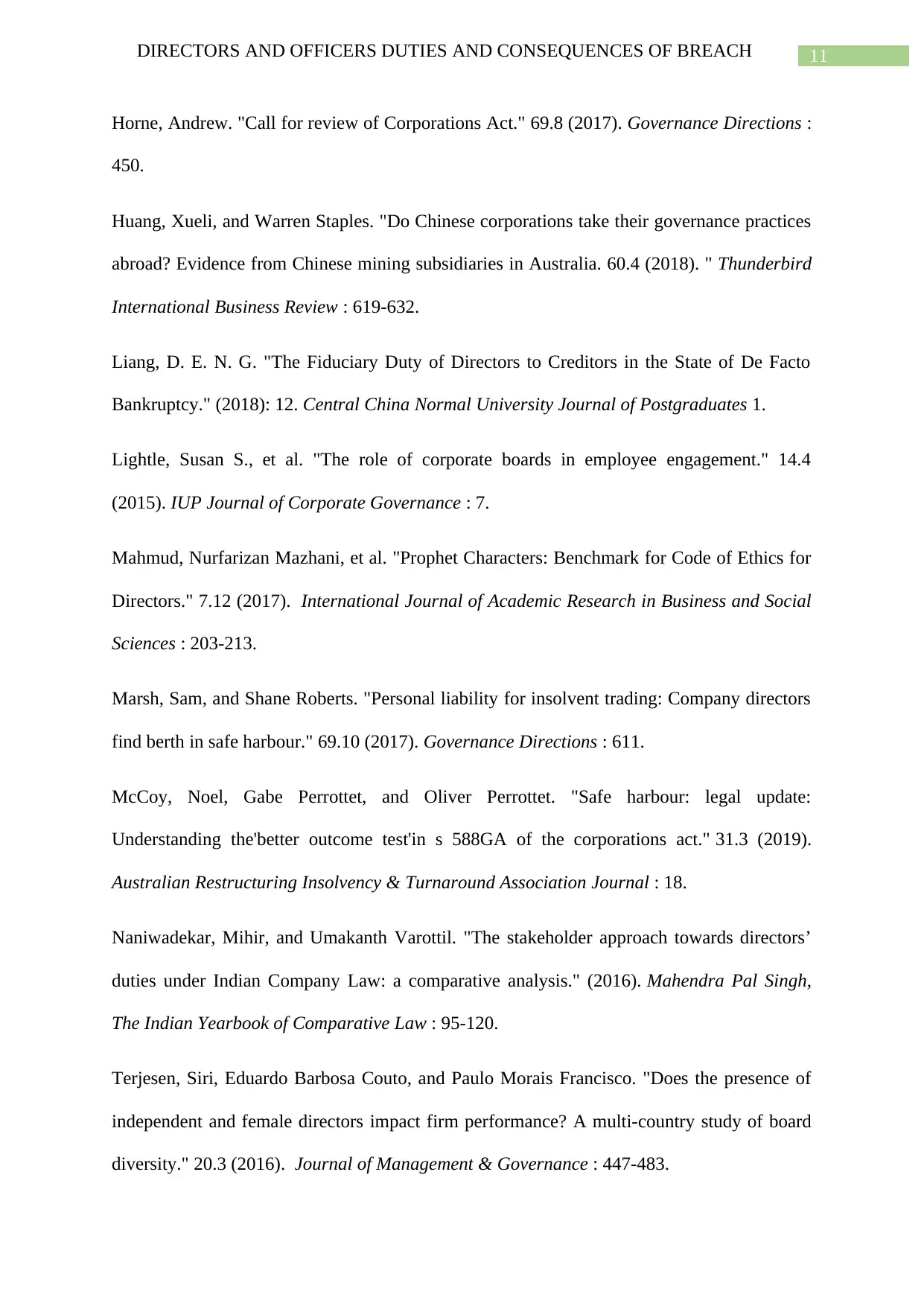
11DIRECTORS AND OFFICERS DUTIES AND CONSEQUENCES OF BREACH
Horne, Andrew. "Call for review of Corporations Act." 69.8 (2017). Governance Directions :
450.
Huang, Xueli, and Warren Staples. "Do Chinese corporations take their governance practices
abroad? Evidence from Chinese mining subsidiaries in Australia. 60.4 (2018). " Thunderbird
International Business Review : 619-632.
Liang, D. E. N. G. "The Fiduciary Duty of Directors to Creditors in the State of De Facto
Bankruptcy." (2018): 12. Central China Normal University Journal of Postgraduates 1.
Lightle, Susan S., et al. "The role of corporate boards in employee engagement." 14.4
(2015). IUP Journal of Corporate Governance : 7.
Mahmud, Nurfarizan Mazhani, et al. "Prophet Characters: Benchmark for Code of Ethics for
Directors." 7.12 (2017). International Journal of Academic Research in Business and Social
Sciences : 203-213.
Marsh, Sam, and Shane Roberts. "Personal liability for insolvent trading: Company directors
find berth in safe harbour." 69.10 (2017). Governance Directions : 611.
McCoy, Noel, Gabe Perrottet, and Oliver Perrottet. "Safe harbour: legal update:
Understanding the'better outcome test'in s 588GA of the corporations act." 31.3 (2019).
Australian Restructuring Insolvency & Turnaround Association Journal : 18.
Naniwadekar, Mihir, and Umakanth Varottil. "The stakeholder approach towards directors’
duties under Indian Company Law: a comparative analysis." (2016). Mahendra Pal Singh,
The Indian Yearbook of Comparative Law : 95-120.
Terjesen, Siri, Eduardo Barbosa Couto, and Paulo Morais Francisco. "Does the presence of
independent and female directors impact firm performance? A multi-country study of board
diversity." 20.3 (2016). Journal of Management & Governance : 447-483.
Horne, Andrew. "Call for review of Corporations Act." 69.8 (2017). Governance Directions :
450.
Huang, Xueli, and Warren Staples. "Do Chinese corporations take their governance practices
abroad? Evidence from Chinese mining subsidiaries in Australia. 60.4 (2018). " Thunderbird
International Business Review : 619-632.
Liang, D. E. N. G. "The Fiduciary Duty of Directors to Creditors in the State of De Facto
Bankruptcy." (2018): 12. Central China Normal University Journal of Postgraduates 1.
Lightle, Susan S., et al. "The role of corporate boards in employee engagement." 14.4
(2015). IUP Journal of Corporate Governance : 7.
Mahmud, Nurfarizan Mazhani, et al. "Prophet Characters: Benchmark for Code of Ethics for
Directors." 7.12 (2017). International Journal of Academic Research in Business and Social
Sciences : 203-213.
Marsh, Sam, and Shane Roberts. "Personal liability for insolvent trading: Company directors
find berth in safe harbour." 69.10 (2017). Governance Directions : 611.
McCoy, Noel, Gabe Perrottet, and Oliver Perrottet. "Safe harbour: legal update:
Understanding the'better outcome test'in s 588GA of the corporations act." 31.3 (2019).
Australian Restructuring Insolvency & Turnaround Association Journal : 18.
Naniwadekar, Mihir, and Umakanth Varottil. "The stakeholder approach towards directors’
duties under Indian Company Law: a comparative analysis." (2016). Mahendra Pal Singh,
The Indian Yearbook of Comparative Law : 95-120.
Terjesen, Siri, Eduardo Barbosa Couto, and Paulo Morais Francisco. "Does the presence of
independent and female directors impact firm performance? A multi-country study of board
diversity." 20.3 (2016). Journal of Management & Governance : 447-483.
⊘ This is a preview!⊘
Do you want full access?
Subscribe today to unlock all pages.

Trusted by 1+ million students worldwide
1 out of 13
Related Documents
Your All-in-One AI-Powered Toolkit for Academic Success.
+13062052269
info@desklib.com
Available 24*7 on WhatsApp / Email
![[object Object]](/_next/static/media/star-bottom.7253800d.svg)
Unlock your academic potential
Copyright © 2020–2026 A2Z Services. All Rights Reserved. Developed and managed by ZUCOL.





